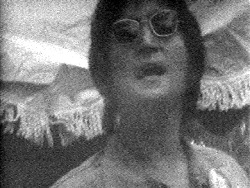Shirley Clarke
Biography
A leading figure in the American avant-garde cinema of the 1950s and 1960s, and a pioneer of video in the 1970s, Shirley Clarke brought a distinctive aesthetic — the "choreography of images" — to her work. In video works such as Tongues (1981-82), a powerful theatrical collaboration with Sam Shepard and Joseph Chaikin, she manipulated image, time and space by applying choreographic editing and technical effects as a dramatic, expressive language.
Clarke trained as a dancer before becoming a filmmaker. Her earliest films, including Dance in the Sun (1953), reflect a rhythmic fusion of human movement and choreographed camera work and editing. An instrumental figure in the experimental cinema verite movement of the late 1950s, Clarke also produced dramatic features and documentaries, including the independent classic The Cool World (1963). In 1970, she formed the Tee Pee Videospace Troupe, a loose collective working in experimental video and theater, and also produced a series of video dance pieces.
Winner of an Academy Award for her 1964 documentary film Robert Frost: A Lover's Quarrel With the World, Clarke also won acclaim for Ornette: Made in America, (1985), a feature-length documentary on jazz saxophonist Ornette Coleman.
Clarke was born in 1925 and died in 1997. She co-founded (with Jonas Mekas) Film-Makers Cooperative and Film-Makers Distribution Center in New York, which offered alternative distribution methods for independent filmmakers. The recipient of grants from the New York State Council on the Arts, the National Endowment for the Arts, and the Rockefeller Foundation, she taught film and video at the University of California, Los Angeles. Clarke's work has been shown at the New York Film Festival; Cannes Film Festival; American Film Institute National Video Festival, Washington, D.C.; and The Museum of Modern Art, New York (a 1971 retrospective), among many other festivals and institutions. She was the recipient of numerous awards, including First Prize at the Venice Film Festival, the Critics Award at the Cannes Film Festival, and the American Film Institute's Maya Deren Award. In 1987, Clarke's films and videotapes were the subject of retrospectives at the Whitney Museum of American Art, New York and the Long Beach Museum of Art, California.
